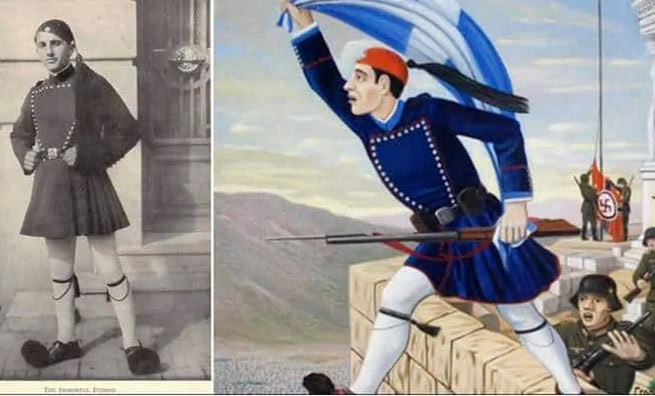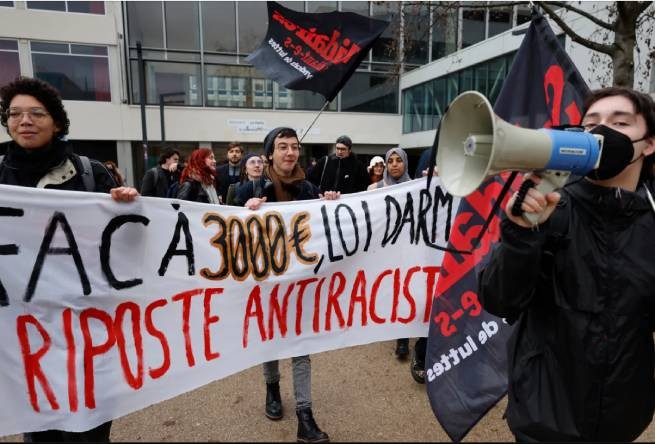Punishments for illegal immigrants, a deposit for studying at universities, deprivation of a residence permit, restrictions on social assistance for migrants – all this and not only in the new anti-migrant law adopted by the French Parliament on December 19.
Main innovations of the law
It is called the toughest and most regressive in the last forty years. The Immigration Control and Integration Improvement Act significantly tightens migration rules for refugees, foreign students, and reuniting families. Both the National Assembly and the Senate voted for the new law. Among the changes:
- quotas for the legalization of foreigners;
- deposit for obtaining a student residence permit (residence permit);
- restrictions on social benefits;
- deprivation of citizenship for the murder of a police officer;
- deprivation of a residence permit for non-compliance with the “principles of the Republic”.
President Emmanuel Macron fulfilled his campaign promise, but found himself hostage to right-wing and far-right forces, and now his own supporters intend to seek the reversal of at least some of the innovations.
Briefly about the reforms:
Migration quotas. Every year, parliament will vote to set a quota for the legalization of all visiting foreigners, with the exception of asylum seekers. Macron’s supporters believe the quota provision is unconstitutional and have asked the Constitutional Council to review it.
Deposit for obtaining a student residence permit. To obtain this document, foreigners will first need to pay a deposit “to cover moving expenses.” The deposit will only be returned after leaving France or changing your migration status from student to worker. Exception: for scholarship holders, recipients of grants from the French government, students from countries with which France has agreements on simplified access to education and some other categories. The bail amount is still unknown. Now students from outside the EU countries, when submitting documents, they are required to confirm the presence of at least 615 euros in their account for each month of living in France or a stable income. Students expect that the deposit may be equivalent to this amount – approximately 6-7 thousand euros per year.
Failure to comply with the “principles of the Republic” will result in deprivation of a residence permit. In 2021, they have already tried to introduce a similar norm into the law “On Separatism” in order to “strengthen the fight against separatism by stopping the issuance of residence permits to persons who clearly expressed rejection of the values and principles of the Republic.” But the left wing of the Senate blocked the initiative, citing “vague language.”
Now this amendment has been carried out, but it is not clear what “principles of the Republic” are meant. Government spokesman Olivier Veren, however, cited a number of examples that can be interpreted as a violation of them: “conspicuous wearing of religious symbols and clothing in schools” and “refusal to interact with civil servants of the other sex for religious reasons.”
Gérald Dermanan, the interior minister, proposed revoking residence permits for anyone who “adheres to radical jihadist ideology,” such as those “who have a photograph of a beheaded Islamic State victim on their mobile phone.”
Social assistance to foreigners will be limited – this has become the most discussed reform. It included:
- reimbursement of housing rental costs;
- family benefits;
- disability benefits;
- provision of temporary social housing and many other programs.
Now unemployed foreigners will be able to apply for social assistance only after five years of residence in the country, and employed foreigners – after 30 months. The new restrictions do not apply to foreign students, people with refugee status and those who have already received a 10-year resident card, also known as a permanent residence permit.
Applicants who are denied asylum and appeal will be banned from the country. Now, even if rejected, the asylum seeker can remain in France during the appeal period, which sometimes drags on for a year or longer. As a result of the reform, asylum seekers who are refused will immediately, even before appealing, lose their right to free medical care and receive a document obliging them to leave the country.
At the same time, to speed up the review procedure, the structure of the National Court of Asylum (CNDA) will be reformed – consisting of three people, it deals with appeals from those people who have been denied asylum. Now only one person will handle the appeal.
Difficulties in obtaining citizenship through family reunification. To apply for family reunification, a wife or husband with foreign citizenship will need to live in France for at least 24 months instead of 18, as before. If now for foreigners to reunite it is enough to demonstrate the presence of a joint income with a French citizen, then the reform will oblige foreigners to prove their own “stable and sufficient” financial situation, provide health insurance and demonstrate a “basic” level of proficiency in the French language. The law does not explain exactly how to prove financial solvency, nor does it say what the required income or savings should be. At the time of filing an application for family reunification, the French husband or French wife must not be 18 years old, as now, but at least 21 years old.
It will be more difficult for children of foreigners to obtain citizenship. With the adoption of the reform, children of foreigners will have only one option: after living in France for at least five years, they themselves apply for citizenship between the ages of 16 and 18. The automatic granting of citizenship at 18 years of age is also abolished. Without the opportunity to acquire citizenship until their senior year of school, experts fear that teenagers growing up in foreign-born families will be more likely to face discrimination.
Fines for illegal residence in France. Since 2012, on the initiative of President Francois Hollande, the persecution of illegal migrants has been abolished in France, and living in the country without documents has ceased to be a crime. With the adoption of the reform package, penalties for illegal residence may be reintroduced. Foreigners staying illegally in France will be fined 3,750 euros and banned from entering the country for three years.
As an experiment, in the next two years, illegal migrants who have lived in France for three years and worked for 12 months out of the last 24 will be allowed to obtain a residence permit with the consent of the city authorities. Officials will check the nature of applicants’ work, their compliance with public order, criminal records, respect for the values of the Republic and other factors.
Why are the authorities simultaneously introducing punishment for future migrants and an amnesty for current ones, explained lawyer and author of the guide on legalization and integration Exil-Solidaire Elizaveta Choi:
“Deportation should become a horror story for those planning to move. In fact, expelling people is a very labor-intensive process, especially in a state that tries not to use illegal methods: the prefect must give a lawful decision, the system must then somehow carry it out… In 2022, for example, only 7% of deportations were carried out. At the same time, illegal migrants already living in the country are a percentage of the population that simply cannot be ignored. Moreover, some of them benefit the economy. For example, rejected asylum seekers , are often healthy young people who have already embarked on the path of integration and, moreover, cope well with work in a bakery or on a construction site.The right is irritated by the first component [невозможности выдворить иностранцев]. And for the sake of some rhetorical and political purposes [министр внутренних дел Жеральд] Dermanan is now destroying the logic of the existence of a social sector for foreigners, which is already fragile.”
Foreigners who have committed crimes will be deported more often. Now French legislation provides almost absolute protection from deportation to many categories of foreigners. For example, husbands and wives of Frenchmen who have lived in the country for more than ten years, as well as foreign citizens who arrived in France at the age of 13 and have lived in it for more than 20 years. These people can only be deported if convicted for more than 10 years or for crimes such as terrorism, espionage or treason.
With the adoption of reforms, the deportation of these people will be simplified: now even those who have lived in France for a long time can be deported abroad if convicted for a term of five years or more, for committing violence against members of their family, for violence against a public official, and also for illegal residence in the country. People who retained their first citizenship will be deprived of French for killing police officers.
Macron’s determination to implement reform, as well as his willingness to make concessions to the right, has a pragmatic explanation. writes Meduza: According to one poll, 71% of French people support the package, including restrictions on social assistance payments to foreigners.
On December 20, representatives of left-wing parties appealed to the Constitutional Council with a demand to check the constitutionality of the adopted laws. Within a month, the council will make a decision, and in January Emmanuel Macron will have to sign the package of laws – in whole or in part.







More Stories
Congressmen warn ICC about sanctions because of Netanyahu
From November 1st, an electronic conscription system will be launched in the Russian Federation.
In a Ukrainian circus, child acrobats fell from a height (video)